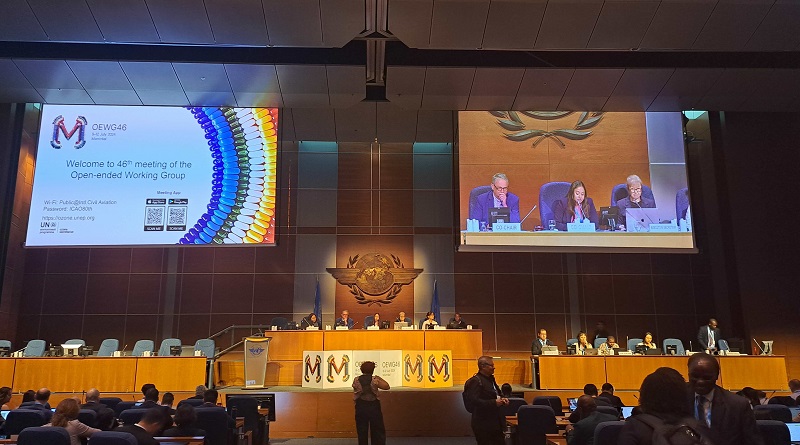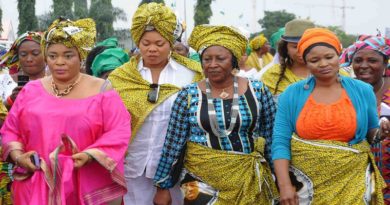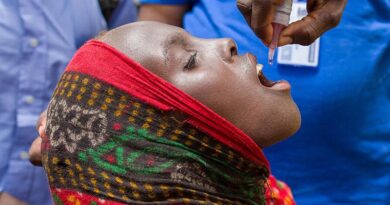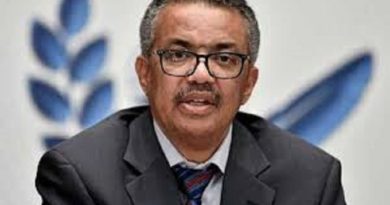Montreal Protocol: Parties meet, discuss on ozone layer, climate protection
The forty-sixth meeting of the Open-ended Working Group (OEWG) of the Parties to the Montreal Protocol on Substances that Deplete the Ozone Layer met in Montréal, Canada, from 8 to 12 July 2024 to consider issues related to ongoing efforts to protect the ozone layer and the implementation of the Kigali Amendment to the Protocol to mitigate climate change. An in-person meeting, it also provided live streaming to allow more persons to follow proceedings remotely.
The parties faced a heavy agenda of issues in preparation for the combined thirteenth meeting of the Conference of the Parties to the Vienna Convention for the Protection of the Ozone Layer (COP13) and the Thirty-Sixth Meeting of the Parties to the Montreal Protocol (MOP36) which is due to take place in Bangkok, Thailand, from 28 October to 1 November 2024. Prior to the meeting, a workshop on life-cycle refrigerant management will be held on 27 October 2024.
Many of the discussions emanated from decisions adopted at MOP35. The parties were provided with presentations and updates from the Technology and Economic Assessment Panel (TEAP) and the Scientific Assessment Panel (SAP) on very short-lived substances (VSLS), feedstock uses of controlled substances and emissions of carbon tetrachloride (CTC). The Environmental Effects Assessment Panel (EEAP) also responded to queries by parties on UV impacts and on forever chemicals (PFAS) on ozone depletion and human health.
Based on the outcomes of the online workshop of experts on the costs of establishing and operating stations for monitoring controlled substances, endorsed by the twelfth meeting of the Ozone Research Managers held in April, and a report by the Secretariat on sustainable funding options, parties explored the cost and running and establishing new stations to enhance the global and regional atmospheric monitoring of controlled substances.
The parties also started more in-depth discussions on emerging challenges such as the feasibility and availability of climate friendly alternative propellants for metered-dose-inhalers (MDIs). Inhalers used for the treatment of asthma and chronic obstructive pulmonary disease currently use hydrofluorocarbons (HFCs). While not ozone depleting, HFCs are climate warming, and the availability of alternatives are anticipated to be more readily available as of 2026.
An update from TEAP on the future use of halons, a fire suppressant widely used in the aviation industry was also considered. The growing scarcity, lack of alternatives and the destruction of halons because it is global warming was discussed at length by the parties.
Building on the workshop during OEWG45 last year on institutional processes to strengthen the effective implementation and enforcement of the Montreal Protocol, parties discussed how to improve the effectiveness of the Protocol to deal with the illegal production and movement of controlled substances as well as options for strengthening HFC licensing systems and the non-compliance mechanism.
The TEAP also provided information on life-cycle refrigerant management (LRM) which the parties will review in more detail during a workshop on LRMs prior to the combined COP13/MOP36 later in the year.
Parties were also provided with an update on energy efficiency technologies which noted that accessibility to some new refrigerants and technologies remains a challenge; and 2025 nominations for a limited use of methyl bromide, an ozone depleting substance used as a pesticide in agriculture; possible compliance deferrals for Article 5, group 2 parties on their HFC phase-down obligations; suggested changes to reporting form for HFC-23 consumption, production and destruction; additional funding support for countries affected in their implementation of the Montreal Protocol due to COVID-19.
In the margins of the Open-ended Working Group meeting a total of 23 side events also took place covering a wide range of topics of interest to delegates and ozone stakeholders.
Discussions were productive and fruitful, parties made good progress with several draft decisions for further work both prior to and during MOP36 later this year in in Bangkok, Thailand.




